Premium Only Content
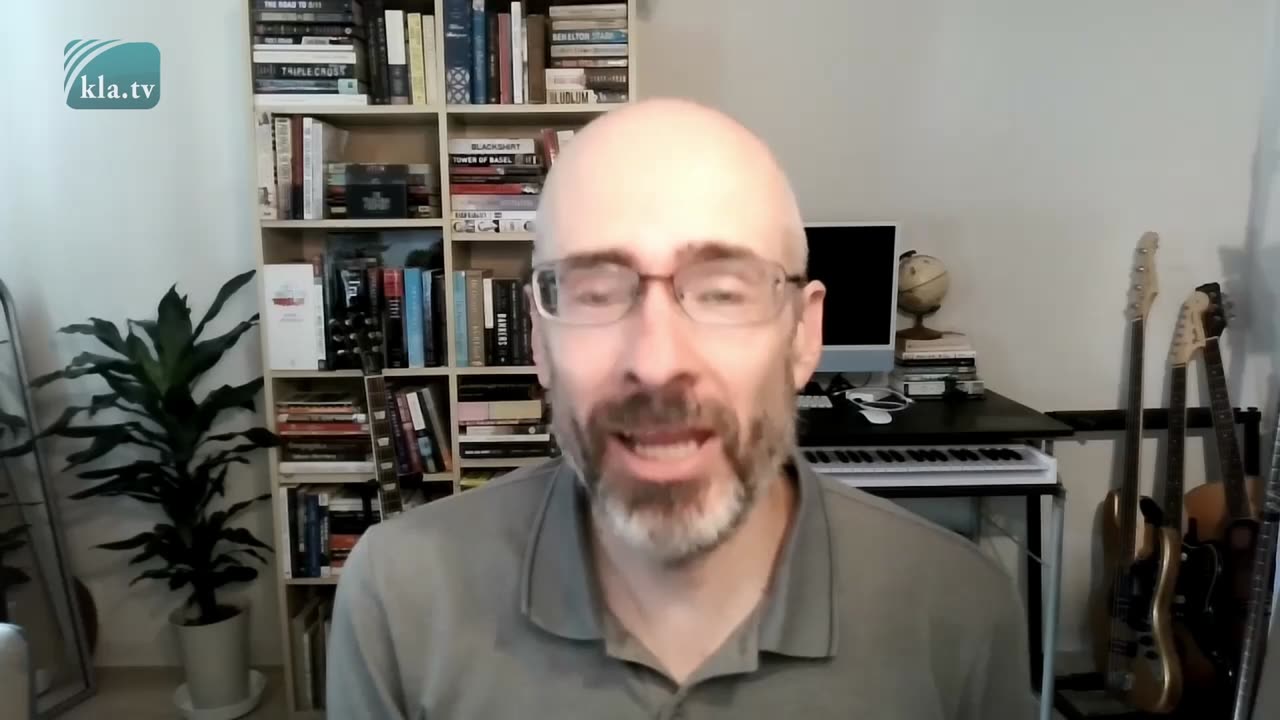
Yes, No, Pass – 10 Questions with James Corbett
Interviewer: Okay, YNP10 with James Corbett. James, question number one. Just to be on the safe side, anyone who has had a personal connection with Jeffrey Epstein should be considered disqualified for public office or position of influence of any sort.
Corbett: Yes. Asterisk.
Interviewer: Okay, do you want to elaborate with the asterisk or move on?
Corbett: Well, I just think that brings with it potentials for abuses. But yes, I get the sentiment behind that. And I agree, at the very least, there should be a big investigation into anyone who is in such a position, yes.
Interviewer: Yes, even guys who long ago denounced their connection with Jeffrey Epstein talking about Trump. Yep. Okay, now, the next five of my questions deal with Trump. I hearken back to when you gave a message, it was beautiful: When he was elected, you came on and did a short, I don't know, five-minute YouTube thing, and you said, “hey, I'm warning you, I'm warning you, don't trust this guy.” And I remember at the time, I was thinking, I was kind of like the Obama supporters who were like, give him a chance, you know? And I felt the same thing about Trump, and man, that was very prescient. But here we go with five questions on Trump. If Trump was on the side of the people, he would have pardoned the January 6th protesters while he had the chance.
Corbett: Yes.
Interviewer: Okay. If Trump was on the side of the people, he would have released the JFK files.
Corbett: Yes.
Interviewer: If Trump was on the side of the people, he would have met with Putin and worked out a peaceful solution to the problems in Ukraine and Syria.
Corbett: I have to pass because I don't agree with the fundamental setup of that question.
Interviewer: How so?
Corbett: Only because, again, I don't think Trump or Putin are ultimately in control of this system. I don't think they're the decision makers. I don't think that the conflict is what it is being portrayed as. I think there are different interests at play, et cetera. So I just don't think that's realistic.
Interviewer: I get you, I get you. It's kind of like when I hear anybody say Biden, I'm always like, okay, the asterisks come up and I don't even know who you're talking about when you say this. So it's the same way for you when you hear the name Trump or Putin.
Corbett: Yeah, ultimately, yeah, he wasn't the decider. It wasn't him who was making the decisions.
Interviewer: Got it, got it. Okay. Is Trump gonna be found guilty and jailed?
Corbett: I genuinely don't know. I genuinely have no idea.
Interviewer: Well, on that note, do you think the prospect of him campaigning behind a prison cell, is this just all part of some big Barnum and Bailey show like some of my friends claim?
Corbett: Absolutely. In fact, yes, I did a “Precedent Trump” episode after the last selection cycle and Biden's win, in which I pointed out Trump was Zaphod Beeblebrox. That is a reference to “Hitchhiker's Guide to the Galaxy”. The president of the galaxy is essentially just this buffoon, this clown that does all this crazy stuff that is simply meant to distract people from actual power. And I think that's exactly what Trump was. That was the purpose and the role that he served. And yeah, I think if the real ruling powers decide that it will be in their interest to distract the public with some crazy arrest and campaigning behind bars and whatever else they need to do for whatever their agenda is, then they'll do that. And again, I don't think it really has anything fundamentally to do with Trump himself.
Interviewer: Yes, yes. You know, even among my friends and coworkers or whatever, that I can convince them that, well, you know, he would have done this and this and this, and he's done this bad thing and this bad. Even when they agree on that, they still sort of love this narrative of, “Boy, they're sure trying to get Trump. They sure don't like Trump, you know?” But I don't know. I think the powers that be like him in many ways. I think they liked him when he tried to assassinate Soleimani. I think they liked him when he fell in line with the pandemic narrative. They liked him when he became Captain Warp Speed, when he became friendly to the idea of mass immigration, for keeping our troops in Afghanistan. I mean, he has played all his cards according to how the powers that be wanted to. Or not?
Corbett: Yes. I mean, more or less, there are many things that you could point to along those lines. I would add the “Assad gassed his own people, and then we got to bomb him.” You know, all of, yes. And yes, time after time, essentially he's just being led along by what his last advisor told him. And yeah, “wouldn't it be great if he had been in power during the scamdemic?” Oh, wait, he was. And we know what that resulted in. So if that's your litmus test, as you said earlier, then yes, he failed that litmus test with flying colors.
Interviewer: Yep, yep. The biggest one as far as I'm concerned. Okay, the last thing on Trump. I haven't seen you in so long. So much has transpired in between. There was a tweet almost a year ago by Ann Coulter. You've probably seen it. It goes like this, quote, 'To Trump, you had your chance. With a Republican House and Senate, you handed domestic policy to your son-in-law and Gary Cohn. You handed foreign policy to your son-in-law and a country that gave your son-in-law $2 billion. Shut the bleep up forever.' End quote. Do you agree with that sentiment in Ann's tweet?
Corbett: Yeah, I have no qualm with that, sure.
Interview: Okay. Okay, do you agree, leaving Trump aside now, do you agree with this statement by John Derbyshire? The United States is, quote, "'moving beyond electoral solutions.'"
Corbett: No, because I don't think electoral was ever a solution. I think that's part of the control process. I think we are living through iterations of the matrix and the most advanced form of control, yet devised politically, is the idea that people putting their ballot in the ballot box every four years is their power. Don't worry, guys. You get the power of the election, the selection. And it is always just a selection. So, no, I don't think voting has ever been an answer. Therefore, it is not becoming less of an answer.
Interviewer: That's right. In a nutshell, it's kind of like that old quote, “if voting mattered, they wouldn't let you do it.” Adam Smith once observed that, quote, "'there is a great deal of ruin in a nation.” If the US has nearly run its course to ruin, would you favor an anticipatory breakup and then realignment of like-minded states?
Corbett: Well, insofar as I always would prefer power to devolve to the lowest possible level, I suppose that's a step in the right direction. And yes, I could understand the arguments that would have been made a couple of hundred years ago of why these various states had to band together, essentially, in the face of the big European powers and all these other outside influences and forces and blah, blah, blah, the state of the world in the 18th century and industrialization and what have you. But now that we're here in the 21st century, why do we have this archaic notion that it has to be, this is the geographical boundary of this political entity that is called the United States of America and it must be ruled from Washington, DC by this many Congress critters and this many senators. Why do we take that as the only way that we can imagine? So anyway, yes, if power could devolve lower down and closer to the people, I think I would be in favor of that, obviously, depending on the way in which that is done. But ultimately, I'm against government of any sorts. So take that, advisedly.
Interviewer: Yeah, okay, great. Well, on that note, we're up to question number nine, but I have to do 9A first and I have to ask you: Would you characterize yourself as a libertarian?
Corbett: I don't characterize myself that way. So I guess the answer is no.
Interviewer: Okay. All right, then here's the question. In one of your most recent videos, you feature an organization that places, well, this is your most recent video. You feature an organization that places posters and stickers with pro-freedom, pro-truth, dissident messages. And you have a special word for it. He said it was propaganda and you said it was like, what, anti-ganda or something. What did you call it?
Corbett: Anti-ganda, yes.
Interviewer: Okay. I guess that's pretty understandable right there. One of the posters says, quote, government is the greatest scam in history, end quote. But aren't governments necessary for the enforcement of laws? And I'm thinking about the, even the Declaration of Independence where there's this part that says, in order to protect these inalienable rights, governments are formed, blah, blah, blah. Isn't it a necessary evil? And isn't it something we have to have to, at the very least, protect our rights? Or can we have sort of this anarcho-capitalist system?
Corbett: Yes, well, okay. So there's a lot of devil in the details of the various definitions that we could apply to the various things that we're talking about here, one of which is government. And there are people who cannot conceptualize the idea of any institution that is currently, or any function that is currently done by government that could not be done by free people coming together voluntarily to contribute to that particular service or function. And one of those is the idea that people could band together to, not even necessarily all together, to provide law and order and the functioning of courts, et cetera. Now, I know that's incredibly difficult to imagine given that we live in a system in which there is the monopoly power of use of force that is granted by the government to itself to essentially enact what it considers to be laws. But we have to defamiliarize ourselves with what we have grown up with and conceptualize that, well, at any rate, we don't even have to speculate. There are different systems that have been applied throughout history. One of which, of course, is the old idea of the common law, which it is not created, it's not penned into existence by some politician that's been elected by some people or whatever the case may be. It is judges discovering law, as they say, not creating law, discovering law, through a process, an iterative process that takes place over generations, if not centuries, to establish in various communities, these are the rules that we have applied, that we have adjudicated over time that establish the norms of this area. And the idea that such a system could function organically without the need for a monopoly force to come in and say, we control this geographical area, we write laws into existence with our pen, and then we enforce them, and we throw you in a cave at the threat of the barrel of the gun, and your ultimate death if you disagree. I think we could, I'd like to think humanity is a little bit past that point. We could conceptualize a different way of doing that that involves voluntary consent of people who are willing to agree and disagree, and adjudicate those matters in various ways. And that does not mean that I think there's some sort of kumbaya utopian future in which all conflict is eliminated from society, quite the opposite. What I'm saying is because there are always gangs of thugs that want control over other people, the first thing we should do to not be ruled over by gangs of thugs is appoint gangs of thugs to protect us from the other gangs of thugs. I think that's a self-defeating concept.
Interviewer: Okay, good. Last question, and this comes, I had to reword it. It was one of my friends is a big fan of yours. He was so excited when he found out I was going to interview you. I had to reword the question so that you could give it a yes or no. And here it is. The pursuit of truth is justification enough to do the work you do.
Corbett: Yes. I don't think it's the only reason that I do it.
Interviewer: I know, so I'm just, this is not a yes, no, so I'm just gonna have to ask his question, and it is, why? Why do you do what you do? Simple as that.
Corbett: I mean, there are all sorts of motivations, and I'm sure some of them are even subconscious or have to do with things that I don’t even consciously hold in my mind, some of which could be completely, totally selfish. It's just, I am this type of person. I am interested in these things. I want to research them. So I research them, and I put that research out for others. And if it's good for them, great, but it's what I'd be doing with my time anyway, even if I wasn't doing it for a living, so to speak. And of course, I'm a human being. I'm motivated by all the things human beings are motivated by. It's great when people tell me, good job, I really liked that podcast, et cetera. So that is some form of motivation. But yes, I'm genuinely interested in the real world. And again, that could be even from selfish things. I just like to know how the world really works so that I can better situate myself within it, let alone just out of natural, innate curiosity that I imagine all people have. Maybe not all people do have, but I certainly do have. I just want to know. I really want to know how the world works. So there's a mishmash of things. One of them is, of course, pursuit of justice, because without a true historical record of what actually occurred and who did what to who, we cannot possibly begin to establish justice. So that is certainly one of the things that does inform my work.
Interviewer: And how much more important is all that stuff when you have children growing up, correct?
Corbett: Absolutely, yeah. And that's, again, yeah, from my own selfish perspective, at the very least, I want to leave the world a better place for my children. But that is, I think that is the thing that has motivated humanity throughout the history of humanity and has allowed people to stand up and to face the evils that they are facing and to do something about them. And it's no different in our generation or any conceivable human generation until we cross that line into the transhuman whatever that the would-be elites are trying to manipulate us into. And then all bets are off the table. But until then, until they quench the dynamic human spirit, we're gonna keep doing this. We're gonna keep fighting. We're gonna keep the flame of human liberty alive and passing it on to the next generation.
Interviewer: Excellent. Well, James Corbett, CorbettReport.com. Thank you so much for the interview today.
Corbett: Thank you.
from
Sources/Links:
https://www.corbettreport.com/
-
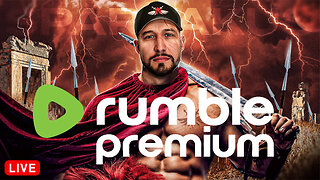 6:34:50
6:34:50
SpartakusLIVE
12 hours ago#1 Saturday Spartoons on RUMBLE PREMIUM
117K7 -
 1:04:59
1:04:59
Man in America
13 hours ago“Summoning the Demon” — The AI Agenda Is FAR WORSE Than We Know w/ Kay Rubacek
53.9K42 -
 2:16:48
2:16:48
Tundra Tactical
11 hours ago $0.12 earned🎯💥 The World’s Okayest Gun Show 🔫😂 | LIVE Tonight on Rumble!
35.3K1 -
 3:36:03
3:36:03
Mally_Mouse
1 day ago🌶️ 🥵Spicy BITE Saturday!! 🥵🌶️- Let's Play: Tower Unite!
60.2K2 -
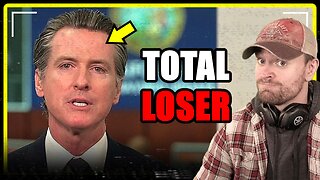 58:59
58:59
MattMorseTV
11 hours ago $1.64 earned🔴Trump just BROKE Newsom.🔴
77.7K88 -
 18:14
18:14
Her Patriot Voice
11 hours agoWho Is WORSE for NYC: Trump Girl or Socialist?
58.4K34 -
 3:39:42
3:39:42
SavageJayGatsby
10 hours agoSpicy Saturday with Mally! | Road to 100 | $300 Weekly Goal for Spicy Bites!
54K1 -
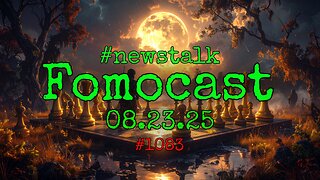 3:35:50
3:35:50
FomoTV
12 hours ago🚨 Swamp Theater: FBI Raids Bolton 🕵 Still NO Epstein Files, Trump's Troops & the Red Heifer Hoax 🐂 | Fomocast 08.23.25
25.3K7 -
 6:04:40
6:04:40
Akademiks
15 hours agoRoc Nation & Meg Thee Stallion did a 7 HOUR Deposition with me. Drake Secret Kid Finally Revealed.
61.2K3 -
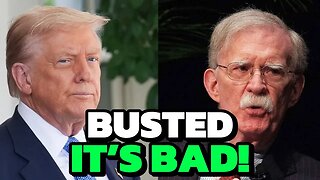 24:19
24:19
Stephen Gardner
11 hours ago🚨BREAKING: FBI Raid of John Bolton’s House Reveals THIS!
63.1K146